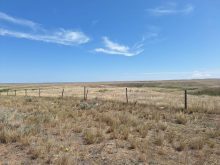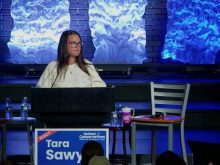af contributor |lethbridge
Farmers, environmental groups and others are calling for open consultations among Albertans and their government on proposals to change water rights.
Most Albertans have no idea of the government’s plans, Lynn Jacobson, an irrigation farmer from Enchant and first vice-president of Wild Rose Agricultural Producers said at a news conference on the banks of the Oldman River in early July. “Even the irrigation districts are in the dark over what changes might be planned.”
Mark Sandilands, speaking for Greensence, an environmental group, called for broad, meaningful consultations and consideration of a full range of policy options, not just an open market.
Read Also

Farming Smarter receives financial boost from Alberta government for potato research
Farming Smarter near Lethbridge got a boost to its research equipment, thanks to the Alberta government’s increase in funding for research associations.
“What will happen in conditions of drought?” he said.
Sandilands said an update to the Water Act is seriously needed, but indications are that the government is headed toward a market-based system that allocates access to water based on the ability to pay.
“Our firm belief is that instead that they should develop a water-allocation system focused on the public interest, by prioritizing ecosystem health and basic human needs, and respecting First Nations Treaty rights.”
Jacobson also called for public consultations on acceptable withdrawals from river systems. He said this discussion is especially needed for the South Saskatchewan, which is overallocated. He said farmers are open to water sales, but not without some consultation.
“We can look at a market system. But that shouldn’t be the only option. As farmers, we need access to water, but we’re not the richest part of society. We don’t want a repeat of the energy regulations. They’ve had huge effects on us but we had no input.”
NAFTA concerns
Jacobson also expressed fears that with a free market, water could be sold to a U. S. buyer. “That would be a mistake we could never, ever retreat from, because of NAFTA rules,” he said. “We need more information.”
That echoes concerns of the Alberta Water Council, which called on the government to enhance education and communication among water users last September. The Water Council is made up of government, industry, and non-governmental groups, including agriculture and environmental representatives.
“Albertans need to have an open and frank discussion on how we manage and use water,” said water council executive director Gord Edwards. “Time is of the essence to ensure Alberta has a water allocation system that will provide sustainable, quality supplies for our communities, our environment, and our continued economic prosperity.”
Some critics are concerned that the province’s Water for Life strategy, which the website says will “provide a competitive economy and quality of life,” is leaning toward a free market in water. “Competitive” in many recent government documents, particularly around health care, has been taken to mean “market based” or for sale to the highest bidder.
Edwards says the cynics are mistaken in their understanding of the government’s water policy.
“Other jurisdictions across North America tell us they would love to have our system,” says Edwards. “They no longer have the opportunity we have. We have a balanced strategy and the political will to manage our water well.”
The Water Council recently prepared a report on improvements to the water-allocation system. Water-allocation transfers have been approved under the Water Act for five years and there have been some large transfers, such as the Western Irrigation District sale to the Balzac mega-mall, and several smaller exchanges.
———
“As farmers, we need access to water, but we’re not the richest part of society. We don’t want a repeat of the energy regulations. They’ve had huge effects on us but we had no input.”
LYNN JACOBSON














